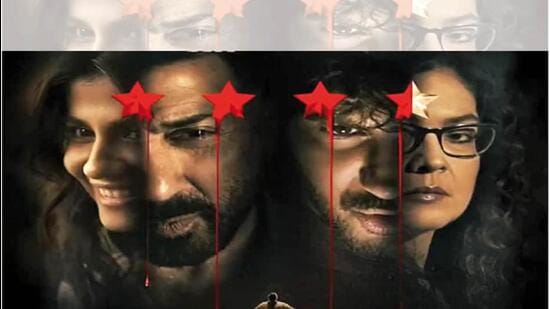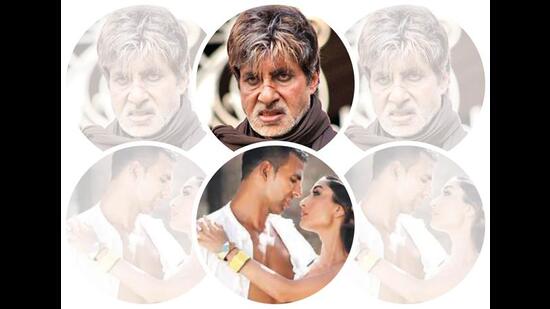Spoilers Ahead by Rajeev Masand: How not to murder a critic
When filmmakers react to reviews, why do they always lose the plot? Critics have gotten a bad rap for as long as one can remember
No matter what side of the argument you’re on, there’s no denying that the premise of R Balki’s latest film Chup is cheeky, provocative, and perhaps even amusing. After all, who doesn’t think the idea of a serial killer going around murdering film critics isn’t at least somewhat funny?

Critics have gotten a bad rap for as long as one can remember. Filmmakers will have you believe that critics actually hate films, that they rip apart movies for sport, that they’re a bunch of joyless cynics who can’t appreciate the hard work that’s gone into the making of someone’s passion project. Poor reviews are frequently cited as the reason that films fail, but equally, critics are dismissed as jokers whose opinions have no impact on the paying public’s decision to watch a film. Basically, critics can’t win.
Love me, love me not
In a recent interview to the Bollywood website pinkvilla.com, filmmaker Sanjay Gupta, who has made films like Kaante, Shootout at Wadala and Kaabil, offered his take on the reason for the spate of flops in Bollywood over the last several months. Gupta explained that his generation of directors grew up on the films of J P Dutta, Mukul Anand, and Feroz Khan “whose heroes came with swagger and punchy lines, and those heroes were not wimps.” In contrast, he said he felt sorry for younger directors working today, “who’ve grown up on Shah Rukh Khan and love stories,” adding that because they weren’t exposed to the machismo-oozing cinema that informed Gupta’s impressionable years, “they go mad in awe when they see films like KGF, RRR, and Pushpa. But that is how it was always meant to be.”
Wait, stay with me. Moments after his presumptuous takedown of the current crop of filmmakers, Gupta identified the real villains. “I say this in jest, but I also mean it. For the current state of cinema, I blame three people: Rajeev Masand, Raja Sen, and Anupama Chopra. These three critics; we started to take them too seriously, and we were trying to impress them, but they hated regular commercial Hindi cinema.”

Then when the interviewer pointed out that the audience has always disregarded critics’ opinions when it comes to watching something they want to, Gupta cited Manmohan Desai and David Dhawan as two of the most successful filmmakers of their time who never got good reviews, but whose careers flourished nevertheless. See what I mean? Heads you win, tails I lose. Critics just can’t catch a break.
Whinemakers Inc.
Now, while there is no evidence to suggest that scathing reviews have triggered anyone, filmmaker or otherwise, to set off on a killing spree (don’t go around giving people ideas, Balki), Chup inspired me to take a closer look at the contentious relationship between those who make films and those who critique them.
In 2012, after The New York Times chief film critic A O Scott wrote a less than glowing review of The Avengers, actor Samuel L Jackson, who played Nick Fury in the Marvel superhero franchise, took to Twitter to attack him: “#Avengers fans, NY Times critic AO Scott needs a new job! Let’s find him one! One he can ACTUALLY do!”
Most people would argue (and they do) that if you can dish out criticism you should be able to take it too. But encouraging his millions-odd fans to heckle a critic on a platform as toxic as Twitter for merely doing his job didn’t make Jackson look good.
The truth is that filmmakers and actors and, frankly, anyone involved in making a film, are extremely vulnerable at the time that their labour of love goes out of their hands and into the world. Of course, negative reviews hurt. Any criticism of something you’ve committed a year or more to painstakingly create feels personal. Even if the review itself isn’t.
Which is why most professional critics will take it on the chin when a filmmaker acts out over an unfavourable review. I speak for myself, but I know other critics too have been snubbed, looked through, attacked on social media, told off in person, and on occasion, have been threatened in response to a bad review. Hold it against me for a few months, I get it. Hold it against me for years, and you’re just being a baby.
Sorry not sorry
When I met producer Sajid Nadiadwala a few months ago, he surprised me by quoting back from my review of his 2009 turkey Kambakkht Ishq. For those unfamiliar with the film, it was a rom-com between a Hollywood stuntman, played by Akshay Kumar, and a medical student, played by Kareena Kapoor, who accidentally ‘loses’ her wristwatch inside his body while performing a surgery on him. The film was unanimously panned by critics and tanked at the box-office, but the producer was clearly still upset that I had questioned Kareena’s motivation for doing a hare-brained film like this.
Few have the grace and tact of Rajkummar Hirani, who pointed to the ping pong table in his office while we were setting up for an interview, casually mentioning that it’s the same one from that (ridiculous) childbirth scene in 3 Idiots that I’d ranted about in my review. Few are as sporting as Ram Gopal Varma who called and laughed for a full three minutes after watching my review of his (awful) Sholay remake at the end of which I threw an egg at the camera, saying it deserved one big anda (zero).
Surely, there is a world where filmmakers and critics who’ve been harsh but honest about their films can coexist without a need for serial killers.
Formerly a film journalist, Rajeev Masand currently heads a talent management agency in Mumbai
From HT Brunch, October 1, 2022
Follow us on twitter.com/HTBrunch
Connect with us on facebook.com/hindustantimesbrunch




